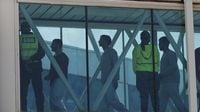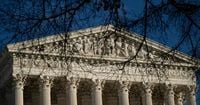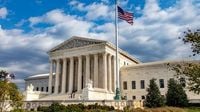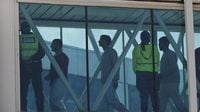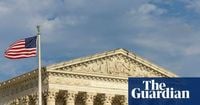The U.S. Supreme Court in the early hours of Saturday, April 19, 2025, issued a ruling that temporarily blocks the deportation of Venezuelan men held in immigration custody in Texas, citing concerns over due process. The justices directed the Trump administration not to remove any detainee from the Bluebonnet Detention Center until further notice, effectively pausing the government's plans to deport these individuals under the Alien Enemies Act of 1798.
This emergency order comes after an urgent appeal from the American Civil Liberties Union (ACLU), which argued that immigration authorities were preparing to resume deportations without allowing the detainees the opportunity to contest their removals in court. Justices Clarence Thomas and Samuel Alito dissented from the majority opinion.
The Alien Enemies Act has historically been invoked only in times of war, with its most recent application during World War II when Japanese-American civilians were held in internment camps. The Trump administration has claimed the act provides them with the authority to swiftly deport individuals they identify as members of the Tren de Aragua gang, regardless of their immigration status.
ACLU lawyer Lee Gelernt expressed relief at the Court's decision, stating, “We are deeply relieved that the Court has temporarily blocked the removals. These individuals were in imminent danger of spending the rest of their lives in a brutal Salvadoran prison without ever having had any due process.”
Prior to the Supreme Court's intervention, two federal judges had declined to issue orders to prevent the deportation of the detainees. On Friday, April 18, 2025, the 5th U.S. Circuit Court of Appeals also refused to grant an emergency order to protect the detainees from being removed.
The ACLU had already filed lawsuits to block the deportation of two Venezuelans held at the Bluebonnet facility, located approximately 24 miles north of Abilene, Texas. In an emergency filing, the ACLU warned that immigration authorities were accusing other Venezuelan men at the facility of being members of the Tren de Aragua gang, making them subject to the deportation proceedings.
Recent reports indicated that some detainees had already been loaded onto buses, with immigration officials telling them that deportations would occur imminently. The ACLU stressed the urgency of the situation, urging the court to act before any removals took place.
In a previous ruling on April 7, 2025, the Supreme Court had clarified that deportations under the Alien Enemies Act could only proceed if individuals slated for removal were given a chance to challenge their deportation through habeas corpus petitions. This ruling highlighted the necessity for the government to afford detainees a reasonable time to contest their removals.
Federal judges in other jurisdictions, including Colorado and New York, have issued orders barring the removal of detainees under the Alien Enemies Act until the administration establishes a proper process for them to make legal claims. However, no such order had been issued in the area covering the Bluebonnet facility.
U.S. District Judge James Wesley Hendrix, a Trump appointee, declined to bar the administration from removing the two men identified in the ACLU lawsuit, citing sworn declarations from Immigration and Customs Enforcement (ICE) that stated the individuals would not be immediately deported. This decision has been met with criticism from advocates who argue that due process is being violated.
The ACLU's filing included declarations from multiple immigration lawyers who reported that their clients had received paperwork indicating they were classified as members of the Tren de Aragua gang and could face deportation as early as Saturday. In one instance, lawyer Karene Brown noted that her client, who only spoke Spanish, was asked to sign documents in English, raising further concerns about the legality of the proceedings.
During a hearing on Friday evening, Gelernt informed District Judge James E. Boasberg in Washington, D.C., that the administration had initially moved Venezuelans to a south Texas facility for deportation but had redirected them to the Bluebonnet facility due to a prior ban on deportations in that region.
Boasberg, who had previously halted deportations in March, expressed sympathy for the ACLU's concerns but stated that he believed he lacked the authority to intervene in this case. He found probable cause that the Trump administration had committed criminal contempt by disregarding his initial deportation ban, particularly regarding the clarity of the paperwork provided to detainees about their rights to contest their removal.
Drew Ensign, an attorney for the Justice Department, countered that individuals slated for deportation would have a minimum of 24 hours to challenge their removal in court. He noted that no flights had been scheduled for Friday evening and that the Department of Homeland Security retained the right to remove individuals as necessary.
In a related development, a Massachusetts judge made permanent a temporary ban on the administration's deportation of immigrants who have exhausted their appeals to countries other than their home countries unless they are informed of their destination and given a chance to object if they would face torture or death there. Some Venezuelans subject to the Alien Enemies Act have already been sent to El Salvador and placed in its notorious prison.
The Supreme Court's decision to pause the deportations marks a significant moment in the ongoing legal battle over immigration policy and the use of wartime laws in contemporary contexts. As litigation continues, the implications of this case could resonate far beyond the immediate situation of the Venezuelan detainees, potentially shaping the future of immigration enforcement in the United States.
